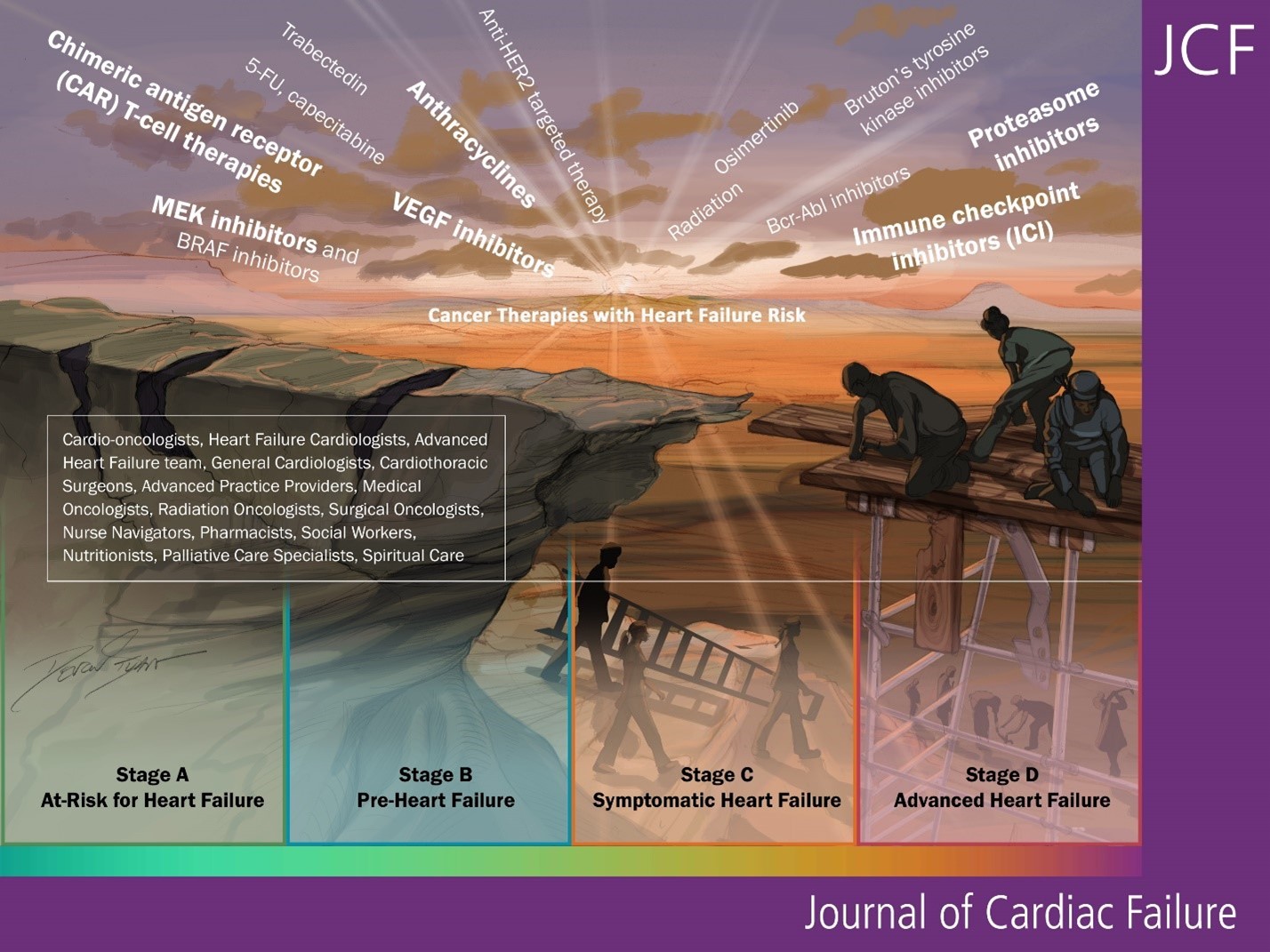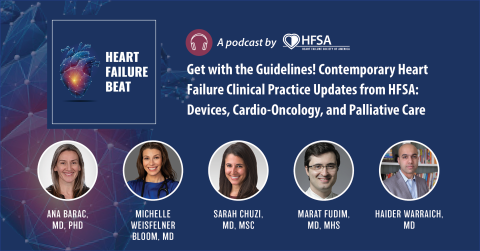Michelle Weisfelner Bloom, MD, Co-Chair, Jacqueline B. Vo, PhD, RN, MPH, Jo E. Rodgers, PharmD, BCPS, BCCP, Alana Ferrari, PharmD, BCOP, Anju Nohria, MD, MSc, Anita Deswal, MD, MPH, Richard K. Cheng, MD, MSc, Michelle M. Kittleson, MD, PhD, Jenica N. Upshaw MD, MS, Nicolas Palaskas, MD, Anne Blaes, MD, MS, Sherry-Ann Brown, MD, PhD, PhD, Bonnie Ky, MD, MSCE, Daniel Lenihan, MD, Mathew S. Maurer, MD, Anecita Fadol, PhD, NP, Kerry Skurka, RN, BSN, Christine Cambareri, PharmD, BCOP, Cynthia Chauhan, MSW, Ana Barac, MD, PhD, Co-Chair.
J Card Fail. 2024 DOI: https://doi.org/10.1016/j.cardfail.2024.08.045
Published October 2024

Supporting Materials
- HF and cancer share common pathophysiological mechanisms for disease incidence and progression with evidence for reciprocal relationship. Patients with cancer are at increased risk for development of HF and patients with HF are at higher risk of developing cancer.
- Beyond anthracyclines and HER2-targeted monoclonal antibodies, very few cancer therapeutics have standardized cardiac imaging surveillance recommendations, resulting in significant variations in clinical practices.
- The concept of "permissive cardiotoxicity" highlights an emerging approach of maintaining lifesaving cancer therapies while accepting some degree of cardiac toxicity and mitigating risk through cardioprotective strategies.
- Heart failure with preserved ejection fraction (HFpEF) is an important yet under-recognized aspect of cancer therapy-related cardiac toxicity, described in a wide array of cancer therapeutics including BTK inhibitors, CAR-T therapies, and hematopoietic stem cell transplantation (HSCT).
- Cardiogenic shock in cancer patients can arise from various causes, including LV dysfunction due to cancer therapies, acute coronary syndrome, stress-induced cardiomyopathy, and immune checkpoint inhibitor-associated myocarditis.
- Durable left ventricular assist devices (LVADs) are feasible for patients with Stage D HF due to chemotherapy-induced cardiomyopathy, with similar survival rates compared to other causes of cardiomyopathy.
- For candidates with a history of cancer, careful and individualized risk assessment in collaboration with oncology specialists is crucial to determine eligibility for heart transplantation. This includes evaluating the impact of pre-existing neoplasms and the risk of cancer recurrence, with a personalized approach essential to prevent unnecessary delays in transplant listing.
- ICI-associated myocarditis should be recognized and treated urgently due to its severe nature and high mortality risk. Multidisciplinary care is crucial for accurate diagnosis and effective management, especially in hemodynamically unstable patients.
- Palliative care involvement is essential for enhancing the quality of life in patients with both cancer and HF, and should be integrated early to manage symptoms, psychological stress, and care coordination. There is a growing push to integrate palliative care practices from oncology and cardiology to better support these patients, supported by clinical research and professional recommendations.
- Racial and ethnic minorities and LGBTQI+ populations experience significant health disparities in cancer and cardiovascular care due to systemic issues like delayed screenings and limited access to quality care. Strategies to address these inequities include community outreach, inclusive research, and improved access to care and clinical trials.
In addition to the statement, two supplemental articles have also been published:
Cardio-Oncology and Heart Failure: AL Amyloidosis for the Heart Failure Clinician A Supplement to the Scientific Statement from the Heart Failure Society of America
-
DOI: 10.1016/j.cardfail.2024.08.046
Heart Failure in Patients with Cancer – A Patient’s Perspective
-
Authored by Cynthia Chauhan, recent winner of the HFSA Heartfelt Hero Award, this article provides a thought-provoking glimpse into the experience of clinical heart failure in a patient with cancer, providing a unique context with which HF clinicians can frame patient discussions and overall care.
- DOI: 10.1016/j.cardfail.2024.08.047
Heart Failure and Cancer: New Insights into a Reciprocal Relationship and Emerging Treatment Approaches
WASHINGTON, DC (OCTOBER 15, 2024) – A new Scientific Statement published by the Heart Failure Society of America (HFSA) has revealed a critical connection between heart failure (HF) and cancer, with shared mechanisms contributing to the incidence and progression of both diseases. Cardio-Oncology and Heart Failure: A Scientific Statement from the Heart Failure Society of America, published today in the Journal of Cardiac Failure (JCF), shows that patients with cancer are at increased risk of developing HF, while HF patients face a higher risk of cancer, emphasizing the need for coordinated care between cardiology and oncology.
“We are only scratching the surface in the expanding field of cancer therapeutics. As we advance, it becomes clear that understanding the full spectrum of cardiac toxicities, including heart failure, is essential for maximizing treatment benefits and safeguarding patient heart health," said co-lead author Michelle Weisfelner Bloom, MD (Division of Cardiology, NYU Langone Health, NYU Grossman School of Medicine, New York, NY).

Heart Failure Beat Interview with Co-Lead Authors
Michelle Weisfelner Bloom, MD and Ana Barac, MD, PhD present the groundbreaking cardio-oncology and heart failure scientific statement, emphasizing the integration of cancer therapies and heart care. They explore strategies to manage treatment-related cardiac dysfunction and propose a "permissive toxicity" framework on this episode, released in December 2024. Tune In >>
